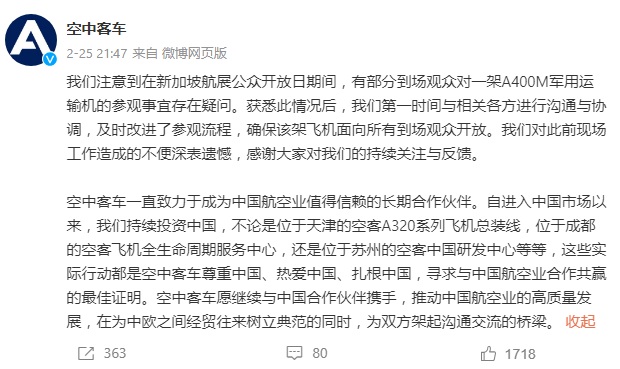Next week might be a Taylor Swift’s week, but last week was the Singapore Airshow’s week.
But this time, people weren’t talking about the planes, but about something else.
Some Chinese & Russians Visitors Allegedly Barred from Entering Aircraft
Several posts on Weibo, China’s popular social media platform, went viral after some attendees voiced their frustrations about being denied access to the Airbus A400M transport aircraft.
The posts were also re-uploaded into TikTok and X.
@moducity 【Chinese Tourists Denied Entry at Airshow? Airbus Responds with Apology】 On February 24th, several Chinese visitors at the Singapore Airshow reported that a German Air Force A400M transport aircraft refused boarding to Chinese tourists during the exhibition. Airbus, the company behind the aircraft, issued an official response on the evening of the 25th, stating that there were no longer obstacles for Chinese spectators to board and view the aircraft since the afternoon of the 24th. Airbus mentioned that upon learning of the situation, they promptly communicated and coordinated with relevant parties, improved the visitation process, ensuring the aircraft is accessible to all attendees. Airbus expressed deep regret for any inconvenience caused earlier during the on-site operations. #singapore #airshow #airbus #a400m #aircraft #news #china #2024 #fyp ♬ 原声 – Moducity
The aircraft, touted by Airbus as its “most advanced, proven and certified airlifter available,” boasts capabilities crucial for both tactical and strategic airlift missions. However, according to these posts, not all visitors were welcome to explore its features up close..
Visitors who appeared to be Chinese, as well as Russians, found themselves barred from entering the aircraft.
This led to allegations of discrimination, particularly after a Weibo user shared his experience of being turned away on Saturday.

He recounted how staff singled out Chinese visitors, with reports of them being explicitly told to leave the queue.
A video circulating on Weibo further illustrated the issue, showing an Airbus staff member inquiring about a blogger’s nationality and subsequently denying him access due to “military restrictions.”
Airbus’ Responds to Criticism
The company took to its official Weibo account to address the concerns, stating that it had immediately taken steps to rectify the visitation process for the A400M aircraft once it became aware of the issue.

Here is a translated version of what they said:
We noticed that during the public open days of the Singapore Airshow, some visitors had questions about the visit to an A400M military transport aircraft.
Upon learning of this situation, we immediately communicated and coordinated with all relevant parties to improve the visitation process promptly, ensuring that the aircraft was open to all visitors. We deeply regret any inconvenience caused by the onsite work previously and appreciate everyone’s continued attention and feedback.
Airbus has always been committed to being a trusted long-term partner in the Chinese aviation industry. Since entering the Chinese market, we have continued to invest in China, whether it is the Airbus A320 assembly line in Tianjin, the Airbus Lifecycle Service Center in Chengdu, or the Airbus China Research and Development Center in Suzhou, among others.
These actions are the best proof of Airbus’s respect for China, its love for China, and its commitment to rooting in China, seeking win-win cooperation with the Chinese aviation industry. Airbus is willing to continue working with Chinese partners to promote the high-quality development of China’s aviation industry, setting an example for Sino-European economic and trade exchanges, while building a bridge for communication and exchange between the two sides.
By Sunday afternoon, reports indicated that Chinese visitors were freely allowed to visit the A400.
However, they had not addressed the “military restrictions” allegations.




